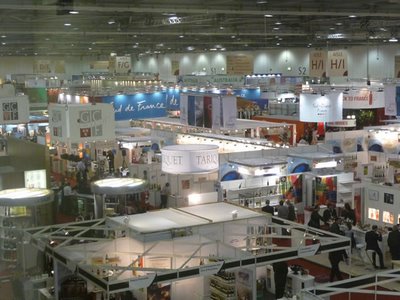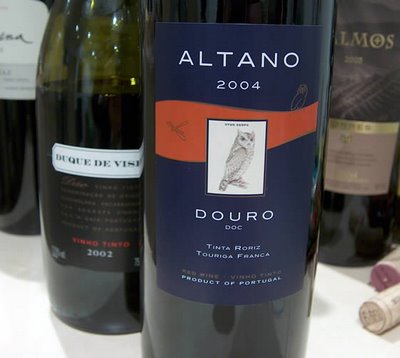LIWF, final day: the future of wine journalism
 Day 3, LIWF. Took part today in a panel on the future of wine writing, organized by Catherine Monahan of Clink Wines. The panel was pretty hardcore, with Mike Paul, Angela Mount, Chris Murphy, Robert Joseph and Richard Siddle.
Day 3, LIWF. Took part today in a panel on the future of wine writing, organized by Catherine Monahan of Clink Wines. The panel was pretty hardcore, with Mike Paul, Angela Mount, Chris Murphy, Robert Joseph and Richard Siddle.I normally shudder at the thought of anything with the word 'future' in the title, but I accepted the invitation, partly out of curiosity. And the discussion was pretty good. It was broad-ranging in scope, covering all manner of topics from social media, newspaper columns, the level of influence wine journos have and the wine merchant's perspective. It focused mainly on mainstream wine. I think Catherine will be doing something with the film of the session, so those who missed it will be able to hear what was said.
Here are some of my random thoughts on the topic, with some thoughts about what it might take to become a wine journo today.
1. What is a wine writer anyway? There are currently a number of people making a successful living out of words and wine, and they seem to be following different models. There's the wine critic model: Robert Parker et al, selling essentially reviews of specific wines. Then there are broadsheet wine journalists, whose primary activity is a newspaper column (Tim Atkin, Anthony Rose). Then there are book authors, whose chief focus is writing wine books (e.g. Tom Stevenson, Hugh Johnson). We mustn't forget broadcasters, either, or people who write articles for trade and consumer magazines. Bea in mind that there are many hybrids out there: people who do a bit of this and a bit of that. There's no one job called 'wine writing'. Jancis Robinson is notable because she spans everything from books to TV to twitter, and is making a great success of using all these different communication tools effectively.
2. I love newspapers and I am glad to have a newspaper column. But newspapers are not doing well financially, and so if your business model relies on getting a newspaper column that will give you a sizeable chunk of your necessary income, then forget it. In the old days you'd get a proper contract and a decent wadge of cash (equivalent of 25-40 K) if you landed a broadsheet wine column. But things have changed. The last two columns to change hands were Victoria Moore taking over from Malcolm Gluck at The Guardian (she's excellent, but does her column in addition to her day job as features writer for The Daily Mail), and Bob Tyrer taking over from Joanna Simon at The Sunday Times (he's a senior manager at the paper and will do the wine column in his spare time).
3. TV trumps everything, still. Especially national TV. One of the reasons Oz Clarke can charge an enormous day rate is because he is in a league of his own in that he's the only wine writer to do regular national TV, and he does it well. Olly Smith has come from nowhere in recent years to be one of the top UK wine journos simply because he's done quite a bit of telly, and he does it very, very well. If a proper celeb took an interest in communicating about wine they'd be catapaulted forwards to the front of the wine writing queue. TV is just so powerful as a medium.
4. So you want to be a wine writer? Not a problem. You need to start by building your own audience. Don't rely on other people and other media platforms – the internet has provided all of us with our own soap boxes. We can all build a tribe of followers. If you have to ask me how, you aren't ready to start, and you clearly don't need it enough to make a success of it.
5. You need to have unshakeable self belief. Now I reckon there's a difference between self-belief and arrogance, and that it's possible to be humble (a good thing) and yet believe that you're better than most of the other guys/girls out there. You have to have absolute confidence in your tasting ability, and also (perhaps more importantly) in your ability to communicate effectively.
6. Don't use your elbows. It is competitive out there – the queue of prospective wine writers is long – buy play nice. The negative energy generated by worrying about the competition and behaving selfishly outweighs any benefit it may bring you. Others higher up in the food chain will likely be nice to you and give you help; make sure that you don't forget to help those around you in turn. Make sure you pay back into the favour bank, and don't just withdraw from it.
7. Is this what you were 'made for'? Is your skill set best suited to this activity? Do you enjoy it enough that putting in silly hours is going to be sustainable?
1. What is a wine writer anyway? There are currently a number of people making a successful living out of words and wine, and they seem to be following different models. There's the wine critic model: Robert Parker et al, selling essentially reviews of specific wines. Then there are broadsheet wine journalists, whose primary activity is a newspaper column (Tim Atkin, Anthony Rose). Then there are book authors, whose chief focus is writing wine books (e.g. Tom Stevenson, Hugh Johnson). We mustn't forget broadcasters, either, or people who write articles for trade and consumer magazines. Bea in mind that there are many hybrids out there: people who do a bit of this and a bit of that. There's no one job called 'wine writing'. Jancis Robinson is notable because she spans everything from books to TV to twitter, and is making a great success of using all these different communication tools effectively.
2. I love newspapers and I am glad to have a newspaper column. But newspapers are not doing well financially, and so if your business model relies on getting a newspaper column that will give you a sizeable chunk of your necessary income, then forget it. In the old days you'd get a proper contract and a decent wadge of cash (equivalent of 25-40 K) if you landed a broadsheet wine column. But things have changed. The last two columns to change hands were Victoria Moore taking over from Malcolm Gluck at The Guardian (she's excellent, but does her column in addition to her day job as features writer for The Daily Mail), and Bob Tyrer taking over from Joanna Simon at The Sunday Times (he's a senior manager at the paper and will do the wine column in his spare time).
3. TV trumps everything, still. Especially national TV. One of the reasons Oz Clarke can charge an enormous day rate is because he is in a league of his own in that he's the only wine writer to do regular national TV, and he does it well. Olly Smith has come from nowhere in recent years to be one of the top UK wine journos simply because he's done quite a bit of telly, and he does it very, very well. If a proper celeb took an interest in communicating about wine they'd be catapaulted forwards to the front of the wine writing queue. TV is just so powerful as a medium.
4. So you want to be a wine writer? Not a problem. You need to start by building your own audience. Don't rely on other people and other media platforms – the internet has provided all of us with our own soap boxes. We can all build a tribe of followers. If you have to ask me how, you aren't ready to start, and you clearly don't need it enough to make a success of it.
5. You need to have unshakeable self belief. Now I reckon there's a difference between self-belief and arrogance, and that it's possible to be humble (a good thing) and yet believe that you're better than most of the other guys/girls out there. You have to have absolute confidence in your tasting ability, and also (perhaps more importantly) in your ability to communicate effectively.
6. Don't use your elbows. It is competitive out there – the queue of prospective wine writers is long – buy play nice. The negative energy generated by worrying about the competition and behaving selfishly outweighs any benefit it may bring you. Others higher up in the food chain will likely be nice to you and give you help; make sure that you don't forget to help those around you in turn. Make sure you pay back into the favour bank, and don't just withdraw from it.
7. Is this what you were 'made for'? Is your skill set best suited to this activity? Do you enjoy it enough that putting in silly hours is going to be sustainable?
8. Who is your audience? Aim too low, and there simply won't be people motivated enough to read your work. Aim too high, and you'll be writing for very few. TV is a good way to reach low involvement consumers, especially when there's interest other than just the wine. So are lifestyle magazines. A mistake is to aim for high involvement consumers (for example, by charging a subscription for content) and then deliver consumer-level reviews about mainstream wines.
9. Find your own voice. Don't assume that what has worked for others will also work for you. You are unique. There's an authentic voice that only you possess, and you need to find it. It's the innovators and risk takers who are likely to get the attention in what is a crowded field.
That's enough for now. It really is a broad subject.
Labels: writing

 The web log of wine journalist Jamie Goode. Feel free to nose around; your comments are welcome
The web log of wine journalist Jamie Goode. Feel free to nose around; your comments are welcome 
